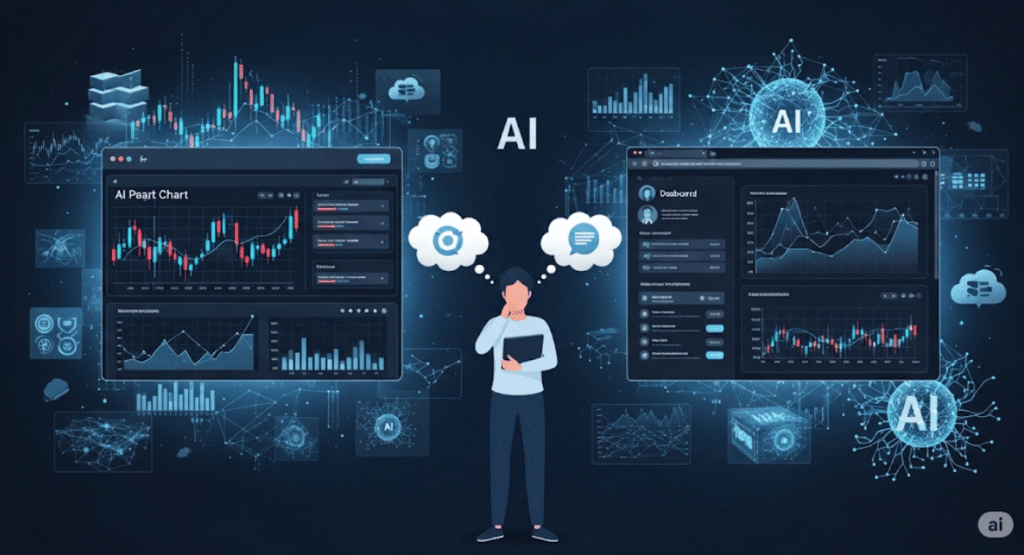📖 Introduction: The Dilemma of Choosing Your Free AI Platform
Confused between desktop and web-based AI tools? Discover the pros, cons, and top picks for choosing your free AI platform for smarter investing and analysis.

In today’s AI-driven landscape, investors and tech users face a critical choice: desktop vs. web-based AI tools. Whether you’re managing a stock portfolio, automating analysis, or learning how AI works, the platform you choose can significantly impact your productivity and security. That’s why choosing your free AI platform wisely is more important than ever.
With a wide array of tools available for free, this guide breaks down the strengths, weaknesses, and real-world use cases to help you make the best decision when it comes to choosing your free AI platform.
🧠 Understanding the Basics: What Are Desktop and Web-Based AI Tools?
💻 Desktop-Based AI Tools
These are software programs you download and install directly onto your device. Examples include:
Local AI model trainers (e.g., AutoGPT, GPT4All)
Trading bots (MetaTrader with AI plugins)
AI-enhanced spreadsheets (Excel + Python add-ons)
Pros:
Faster processing (when using local hardware)
Better offline access
Full control over data
Cons:
Requires installation and storage
Platform-dependent (Windows, macOS)
🌐 Web-Based AI Platforms
Hosted in the cloud, these platforms are accessible through any browser. Examples include:
ChatGPT, Bard, Claude
AI stock analysis dashboards (FinChat, Tickeron)
No-code platforms (like Peltarion, RunwayML)
Pros:
No downloads required
Use anywhere, anytime
Regular updates and scaling
Cons:
Requires constant internet
More reliance on vendor for data security
When choosing your free AI platform, understanding these distinctions is crucial for making the right call based on your needs.
🧩 Choosing Your Free AI Platform: Factors to Consider
1. 🚀 Performance Requirements
If you’re doing heavy lifting—like training ML models or rendering high-res data visualizations—desktop wins. For quick insights and AI-powered reports, web apps do the trick.
When performance is a concern, choosing your free AI platform comes down to computing power vs convenience.
2. 🔒 Data Privacy and Security
Concerned about your data being exposed or misused? Desktop AI tools store data locally, giving you more control. Web tools, unless encrypted and well-secured, may share data with third-party servers.
For security-focused users, choosing your free AI platform with offline options might be safer.
3. 🌍 Accessibility and Portability
Need to switch between devices or work while traveling? Web-based tools offer seamless cross-device use. You can log into your AI dashboards from mobile, desktop, or tablet anywhere in the world.
4. 🛠️ Customization and Advanced Features
Desktop tools allow you to:
Integrate APIs
Run scripts
Modify source code
Web platforms are usually plug-and-play with limited flexibility.
So, choosing your free AI platform depends on whether you prefer convenience or customization.
5. 💰 Hidden Costs and Freemium Models
Free doesn’t always mean totally free. While most web platforms start with free tiers, many hide key features behind paywalls. Desktop tools, especially open-source ones, may offer more without subscriptions.
🧪 Case Study Comparisons: Desktop vs Web-Based Free AI Tools
📊 Stock Market Analysis
| Feature | Desktop (e.g., MetaTrader + AI Plugin) | Web-Based (e.g., Tickeron) |
|---|---|---|
| Real-time data | High (based on broker feed) | High (cloud-fed APIs) |
| Custom indicators | Yes (code required) | Limited to presets |
| AI predictions | Plugin-dependent | Built-in predictive models |
| Portability | Limited | High (accessible via browser) |
Verdict: For hands-on traders, desktop is powerful. For passive or mobile investors, choosing your free AI platform online makes more sense.
📈 Personal Finance AI Assistants
Desktop Example: Budget AI (Excel plugin with GPT integration)
Web Example: Cleo AI, FinChat, YNAB AI
Desktop tools let you automate based on your custom data, but web tools offer chat-based, friendly interfaces and easier access.
Verdict: For simplicity and daily use, choosing your free AI platform on the web is more intuitive.
🌐 Popular Web-Based AI Platforms (Free)
These platforms are browser-based and regularly updated—ideal for users choosing your free AI platform with convenience in mind.
💽 Popular Desktop-Based AI Tools (Free or Open Source)
| Tool Name | Use Case | AI Integration Level |
|---|---|---|
| AutoGPT | Autonomous agents | GPT-based automation |
| Python + Pandas | Data modeling | Full AI model building |
| Scikit-learn | ML development | Custom model training |
| LM Studio | Local LLM runner | Chat with AI offline |
These tools require technical knowledge but offer maximum control — a great choice when choosing your free AI platform for advanced usage.
📚 Tips for Choosing Your Free AI Platform (2025 Best Practices)
Know your goal: Trading? Research? Automation? Match the platform to your needs.
Test both types: Most platforms offer trials. Try desktop and web before committing.
Check compatibility: Web is better for mobile; desktop may need OS-specific downloads.
Explore community support: GitHub and Reddit are gold mines for help with desktop tools.
Update regularly: Security patches and AI model upgrades are more seamless on web-based platforms.
📱 The Future of AI Platforms: Hybrid Is Coming
By 2026, expect to see hybrid AI platforms that combine:
Local processing (for privacy)
Cloud dashboards (for accessibility)
AI avatars or copilots across devices
These platforms will make choosing your free AI platform less of a tradeoff and more about customization.
🧾 Conclusion: Which AI Platform Is Right for You?
When it comes to choosing your free AI platform, there’s no one-size-fits-all. Consider:
| You’re A… | Go With… |
|---|---|
| Data analyst or coder | Desktop AI |
| Investor or trader | Web-based dashboards |
| Traveler or remote user | Web-based AI |
| Security-conscious | Local desktop tools |
| Beginner | Web with chatbot UI |
Ultimately, choosing your free AI platform should align with your skills, goals, and the level of control you want over your data and experience.


Pingback: Why Diversification Still Matters, Even with AI: Smart Investing in 2025 - Trade Pluse Ai